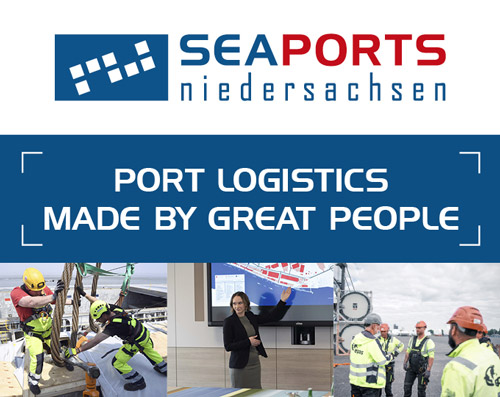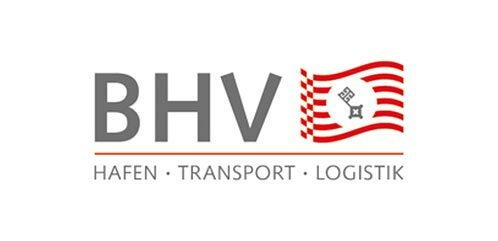Opinions on China are divided Whereas some want to jump on the bandwagon of economic success by collaborating with the People’s Republic, others are cautioning against the promises offered by the Far East.
Photo: Shutterstock/Maxx-Studio
On the one hand, one end of the spectrum, the Middle Kingdom has emerged as the world’s second largest economy, Germany’s largest trading partner and a highly active investor in Europe. On the other hand, many experts highlight the dwindling domestic demand in China and the fact that the country announced that it would make extensive commitments to open its own market when it joined the World Trade Organization (WTO) in 2001, but that these promises were not followed by the necessary action. They particularly criticise the lack of fair competition and the absence of reliable framework conditions. Against this backdrop, numerous players – not only in the maritime economy and logistics – are undertaking a true balancing act: They want to seize the opportunities presented by China’s economic development for their own benefit – but at the same time they cannot ignore the fact that there may also be dangers lurking in this cooperation. After all, so far it is not yet clear whether an ambitious partner and solvent investor has been brought on board or whether it is in fact a rival, which in some places is already being called the “voracious Chinese dragon”.
Cooperation with a potential for conflict
“It is especially the German export sector’s core business in the fields of mechanical engineering, motor vehicles and motor vehicle parts, electrical engineering and chemicals that can benefit from cooperation with China,” comments Katharina Viklenko, China expert at Germany Trade & Invest (GTAI), the foreign trade and inward investment agency of the Federal Republic of Germany. The intensive bilateral economic relations in particular would provide companies with numerous sales and investment opportunities. For instance, companies from both countries have worked together in future-oriented fields such as robotics, autonomous driving or Industry 4.0. “But these areas of cooperation also present potential for conflict, as is illustrated, for example, by the current debate surrounding Huawei’s participation in the expansion of the 5G network,” Viklenko said. For her, the Middle Kingdom is increasingly developing into a competitor for the EU and for Germany, especially with regard to third markets. Viklenko elaborates that “since the activities of Chinese companies are supported politically and financially by the Chinese government not only domestically, but also abroad, German and European companies can hardly keep up.” She cites Africa as an example, where China is increasingly taking over the EU’s role as a major supplier. “Since 2000 the EU has lost 18.6 percentage points of its share of African imports, while the People’s Republic has gained 17.3 percentage points. A similar situation can be seen in Latin America, where both the EU and Germany felt the pinch,” warns Viklenko. Another crucial point: While foreign investors in Germany are treated like domestic companies as soon as they have established themselves, German companies in China are subject to numerous restrictions. “These obstacles include joint venture constraints, more difficult access to public procurement, interference in foreign companies by party officials as well as unequal treatment of domestic and foreign companies, for example through subsidies and preferential treatment of Chinese state-owned companies,” explains Viklenko. She therefore identifies a considerable need for action to establish a level playing field. She outlines her stance on this as follows: “In order for bilateral cooperation to successfully develop any further, the People’s Republic needs to open its markets wider and introduce systematic reforms. Only genuine competition leads to fruitful results and high-quality products from which both sides can benefit equally.” She believes that the new foreign investment law adopted in March 2019 could have an important signalling effect, as long as expectations for increased legal certainty are not disappointed.
An important element of the New Silk Road is the transport of goods via rail. As a result, the number of container trains between China and Europe is steadily increasing. (Photo: Shutterstock)
New Silk Road with or without a final destination
In the coming years, one of the greatest challenges in the economic interaction with China is expected to be the infrastructure programme for the New Silk Road initiated by the Middle Kingdom in 2013, which bears the official project name “Belt & Road Initiative”. For this purpose, the routes following the historic Silk Road are to be revived with numerous measures on land and water in order to advance the expansion of international trade relations with a new network between the Far East and Western Europe. This is a project that does not, however, meet with unrestrained enthusiasm. “For one, the New Silk Road has the potential to build urgently needed infrastructure and also to promote economic development in the relevant countries by means of investments in various sectors. At the same time, however, some projects lack profitability and sustainability,” explains Lisa Flatten, coordinator of the New Silk Road at GTAI, in summarising the situation. She also believes that the loans granted by Chinese financial institutions will increase the debt burden for countries that in most cases already have a high risk of incurring debt. As a result, China’s economy will ultimately be the main beneficiary of the initiative, while German companies will be more likely to record successes indirectly than through direct participation. “China will seek to extend the initiative to as many countries as possible. Therefore, the New Silk Road is unlikely to have a genuine regional end destination,” she assessed. With this she contradicts all those who are already trying to establish their location as the definite end destination of the project. Flatten’s opinion is also supported by Christoph Bruns, Managing Director of the port authority of Bremen Bremische Hafenvertretung (BHV) and Managing Partner of the Mund + Bruns firm of consultants. Bruns says: “The very fact that individual states, cities and ports are claiming to be the final destination of the Silk Road shows me that they have not yet grasped the concept of logistics. Nevertheless, I believe it is to be welcomed when politics and industry reflect on new transport routes and infrastructures across country borders out of economic, political and above all environmental considerations.”
Respectful interaction represents the biggest challenge
In recent years, Bruns has identified considerable improvements with regard to cooperation with China. Some years ago, it was for instance much more difficult and complicated for European companies to establish a direct branch in China. “Before, you had to take a detour via a company in Hong Kong; today it is much easier and more transparent to become active in China,” comments the BHV Managing Director. In this context, it is always important to accept that different values and ideas of economic and cultural cooperation exist in China than those we have here: “Regardless of whether we demonise globalisation or see it as a bearer of salvation for our global economy – it is important that we always treat each other with respect. And it is exactly this respectful interaction that poses the greatest challenge we have to face.” He considers communication to be the most important tool for achieving this – knowing full well that using the English language as an indirect route is helpful, but it also represents a way of going about the process in which a lot of information is lost. But from his experience, he also knows that Chinese people generally tend to think on a larger scale and plan for the long term compared to Germany and Europe. “We should not expect processes to develop in China that would allow for major changes within a matter of months or within European legislative periods. Nor should we believe that aggressive and provocative political interference in Chinese reasons of state and daily politics would have an immediate effect. Experience has shown that an honest and open approach to partnership without communicating in a highly public or party-political way is far more effective and healthier,” he says, pointing out one possible path to success.
China holds the number two position in Bremen’s ports
The exchange of goods with China is of great strategic importance with regard to trade in Bremen’s ports. “Although USA shipping traditionally forms the dominant basis for cargo handling in Bremen and Bremerhaven, trade with China is already in second place,” explains bremenports Managing Director Robert Howe. In numerical terms, that means: Out of the approximately 74.4 million tonnes that were transshipped by sea in Bremen’s ports in 2018, about 18.4 million tonnes (25 per cent) went to or came from the United States. In China’s case, the figure was around 6.1 million tonnes (nine percent). Even in the smallest federal state in Germany, the USA ranks ahead of China in terms of container transports. There, the United States accounted for roughly 15.9 million tonnes (28 percent) in 2018, while the East Asian country accounted for approximately six million tonnes (eleven percent). “Especially with regard to container traffic with China, there is still a lot of growth potential for the future. In this respect, our port infrastructure offers the best conditions for the latest generation of container ships,” Howe stated in identifying potential opportunities for further growth. Timo A. Schön, Managing Director of the Seaports of Niedersachsen, has a similar view of the current situation. Schön states that in Cuxhaven, Wilhelmshaven, Brake and Emden, around 2.68 million tonnes – representing just over five percent of the 53.5 million tonnes handled in the ports of Lower Saxony – are currently accounted for by shipments to and from China. “China’s significance as an economic partner for Lower Saxony’s maritime industry is not only evident from the high proportion of containers being handled at the JadeWeserPort. Its importance is also emphasised by Chinese investments in Lower Saxony’s port locations, such as Titan Wind Energy in Cuxhaven or China Logistics in Wilhelmshaven. On top of this, China also remains an important sales market for our Lower Saxony companies such as Volkswagen, for example.”
Most read
Logistics Pilot
The current print edition - request it now free of charge.
Shanghai (left) is the largest city in China and is considered a global financial centre. From its port there, the largest container port in the world, numerous boxes are also transported to the Bremen ports, such as here (right) to Bremerhaven. In terms of the exchange of goods with Bremen’s ports, China is second only to the USA.
In 2019, “8,000 vehicles were brought to China using this approach,”.
Stefan Nousch Sales Manager at BLG Automobile Logistics
From Bremerhaven to Chongquing in 20 days
One example of efficient cooperation with China is illustrated by the BLG LOGISTICS GROUP in its automotive division. The facility handles and processes 6.3 million vehicles a year and transports them all over the world by train, truck or ship – including to China. There has also been a regular rail connection in the Middle Kingdom between Bremerhaven and Chongqing since April 2019, which forms part of the “One Belt, One Road” initiative. A train with up to 44 wagons departs twice a week from the seaside city on the shore-based Silk Road and 20 days later arrives with its cargo at the metropolis with a population of 32 million in central China. Stefan Nousch, Sales Manager at BLG Automobile Logistics explains that “whereas the majority of trade goods to and from China are shipped on the water-side Silk Road, goods transported by rail are particularly suitable for high-quality and seasonally critical goods.” A renowned automotive client of BLG also makes use of this shore-based option. His sports cars are delivered by rail and truck and are sorted and stored in Bremerhaven. Although many customers then opt to take their cargo over the quay and onto the ship bound for China, the exclusive cars in question make their way via the container packing station, where they are prepared for container shipment and securely packed before their train journey to Chongqing begins. “In 2019, 8,000 vehicles were brought to China using this approach,” Nousch reports. Consequently, the BLG terminal in Bremerhaven is considered an important hub for vehicle exports to China. Here, manufacturers can still decide whether their cars should travel to Asia by roll-on/roll-off ships or by rail. “Having a start and end point in Bremerhaven, this automobile terminal has a unique selling point in terms of logistics for the automobile industry’s trade with China,” says Nousch. Therefore, he believes the following to be certain: “From the point of view of finished vehicle logistics, the New Silk Road offers additional logistics and transport solutions for import as well as export.”
Cuxhaven proves to be attractive for China
The Chinese market is becoming increasingly important in Cuxhaven as well. For instance, through its European subsidiary, the Chinese group Titan Wind Energy has taken over the operations of the insolvent Ambau GmbH, a manufacturer of towers and foundation structures for offshore and onshore wind turbines. In this way, the Chinese are looking to expand their European business operations out of Cuxhaven. Furthermore, in order to enable long and heavy cargo (such as those shipments that come from China to Cuxhaven by seagoing vessels on behalf of the wind turbine manufacturer Vestas Wind Systems) to be transported on the road without any problems, the roundabout at the end of the A27 motorway was recently modified so that unrestricted passage is now possible. At present, several globally operating logistics companies are already making use of Cuxhaven as a transhipment centre for containers from China, which arrive at the mouth of the Elbe by rail or truck and are then shipped on to Immingham in Great Britain on the daily ferries operated by the DFDS shipping company. “There are also current efforts to put English-made cars into containers and to transport them to China via rail in the opposite direction,” says Oliver Fuhljahn, Cuxhaven Site Manager of the Seaports of Niedersachsen. (bre)
In 2019, “8,000 vehicles were brought to China using this approach,”.
Stefan Nousch Sales Manager at BLG Automobile Logistics
Made in Germany meets Chinese diligence
LOGISTICS PILOT interviewed experts in Bremen and Lower Saxony independently of each other in order to obtain a current market evaluation. Both Dr. Sandra Heep, Professor of Chinese Economy and Society and Head of the China Competence Centre at the City University of Applied Sciences in Bremen, and Professor Michael Zhengmeng Hou, China Representative and Head of the Competence Centre at the Clausthal University of Technology, emphasised the importance of mutual understanding.
To what extent can German companies benefit from the cooperation with China? Or do you believe that China’s global influence will have a negative impact on Germany?
Prof. Heep: Owing to its considerable economic weight and its persistently high growth rates, China remains an important sales market for German companies. The latter can also benefit from collaborating with financially strong Chinese investors. Additionally, given the increasing internationalisation of Chinese companies, opportunities for cooperation between German and Chinese companies also exist on third markets.
Prof. Hou: Numerous large companies in Germany especially benefit from China being the largest market worldwide. One example can be seen at Volkswagen Group China, which in 2018 delivered 4.21 million vehicles to Chinese customers, a record result in the passenger car market. Yet another example is Sympatec GmbH, a company based in Clausthal-Zellerfeld, Germany, that develops instruments for the analysis of particle size and shape and has thus successfully been serving the Chinese market for over 25 years. In any case, I do not think that China’s global influence will have a negative impact on Germany, since Germany itself always has and will continue to have a decisive position in world politics and economy.
In recent times, there has been a rapid increase in Chinese investments in Germany, especially in the area of company takeovers. How do you interpret this development?
Prof. Heep: Fundamentally, Chinese investments in Germany are to be welcomed. At the same time, however, they should go hand in hand with a reduction of investment barriers for German companies in China. Politicians and business in Germany should also not turn a blind eye to the fact that Chinese company takeovers in the high-tech sector often take place in the context of government subsidised programmes aimed at acquiring cutting-edge technology abroad, which could very well damage the international competitiveness of the German industry in the medium term.
Prof. Hou: Although this statement holds true, it has to be put into perspective because German investments in China are still larger than Chinese investments in Germany. The rapid development of China means that especially private companies there have taken note of the investment opportunities in Europe and especially in Germany thanks to the excellent quality and the reputation “made in Germany”. That is why I consider this development to be a logical consequence of China’s rapid growth over the last 40 years. Having said this, the investment conditions of both countries should be aligned and barriers should be eliminated on the one hand. While, on the other hand, investment regulations in the form of state controls must be put in place to safeguard, for example, against the complete takeover of sensitive high-tech companies by investors from the respective country.
Do you perceive the New Silk Road to be more of a curse or a blessing?
Prof. Heep: The planned expansion of infrastructure as part of the Silk Road initiative holds the potential to improve global networking and to thereby provide the world economy with new stimuli for growth. Nonetheless, many planned projects are confronted with technical, financial or political obstacles during implementation. Consequently, the success of this initiative will depend on whether the Chinese government will succeed in overcoming these obstacles in cooperation with its international partners, for example by finding a mutual agreement on viable financing models.
Prof. Hou: I believe the New Silk Road to be a blessing: This will enable Germany and China to jointly implement further large-scale projects, especially in third countries, whereby both countries have to regard each other as partners and not as rivals. China is highly interested in taking further steps, particularly alongside Germany, but it must not end up being a one-way street either. In my view, this combination of German craftsmanship and engineering skills and the label “made in Germany”, coupled with the diligence and high flexibility of the Chinese, represents a win-win situation, especially for third countries along the New Silk Road.












